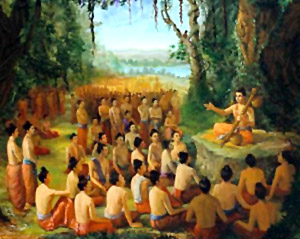 The Sarvam Khalvidam Brahma Mahavakya is the last stage of man`s realisation towards absolute reality. However, this realisation comes in stages. First, there is cognitive understanding of the meaning and then the intuition rolls down, thus revealing deeper meanings. Gradually, one comes to understand and gradually experience the deeper aspects of the other Mahavakyas. This Mahavakyas offer a gradual realisation through its chronological order. The meanings of the Mahavakyas are as follows -
The Sarvam Khalvidam Brahma Mahavakya is the last stage of man`s realisation towards absolute reality. However, this realisation comes in stages. First, there is cognitive understanding of the meaning and then the intuition rolls down, thus revealing deeper meanings. Gradually, one comes to understand and gradually experience the deeper aspects of the other Mahavakyas. This Mahavakyas offer a gradual realisation through its chronological order. The meanings of the Mahavakyas are as follows -
* Brahman is real; the world is unreal.
* Brahman is one, without a second.
* Brahman is the supreme knowledge.
* That is what you are.
* Atman and Brahman are the same
* I am Brahman
As a person comes to experience the truth of the individual Mahavakyas; it seems that they come together in the form of a song that exclaims in joy, "All of this is Brahman!" The Mahavakyas initiates a process that comes from person-to-person listening (written and oral), followed by deep reflection, observation, and meditation.
Finally, it is as if the one doing the practice travels upwards to unite directly with experience, even though there was never any division in the first place. One should allow his awareness to try to encompass, at one time, the entire real and unreal universe, the objects and people in the world, as well as his own body and mind. One should hold these together, as one whole, and reflect on the particular words, "All of this is Brahman! All of this is one!" This Sarvam Khalvidam Brahma Mahavakya builds on the other practices, and expands in its experience.
Finally, the mind is set-aside in an explosion of awareness and eventually, the depth of meditation and the aspirant achieves contemplation or Mantra Siddhi. The truth of the Mahavakyas comes forward and is seen to have been there all along, ever still, waiting to be discovered in direct experience. The last stage of realisation is the Sarvam Khalvidam Brahma Mahavakya. The entire universe is Divine which also includes our self. The Divine is also the being principle in all things. It is the ultimate as well as the inmost subject in all beings. It is all in one and one and all.









